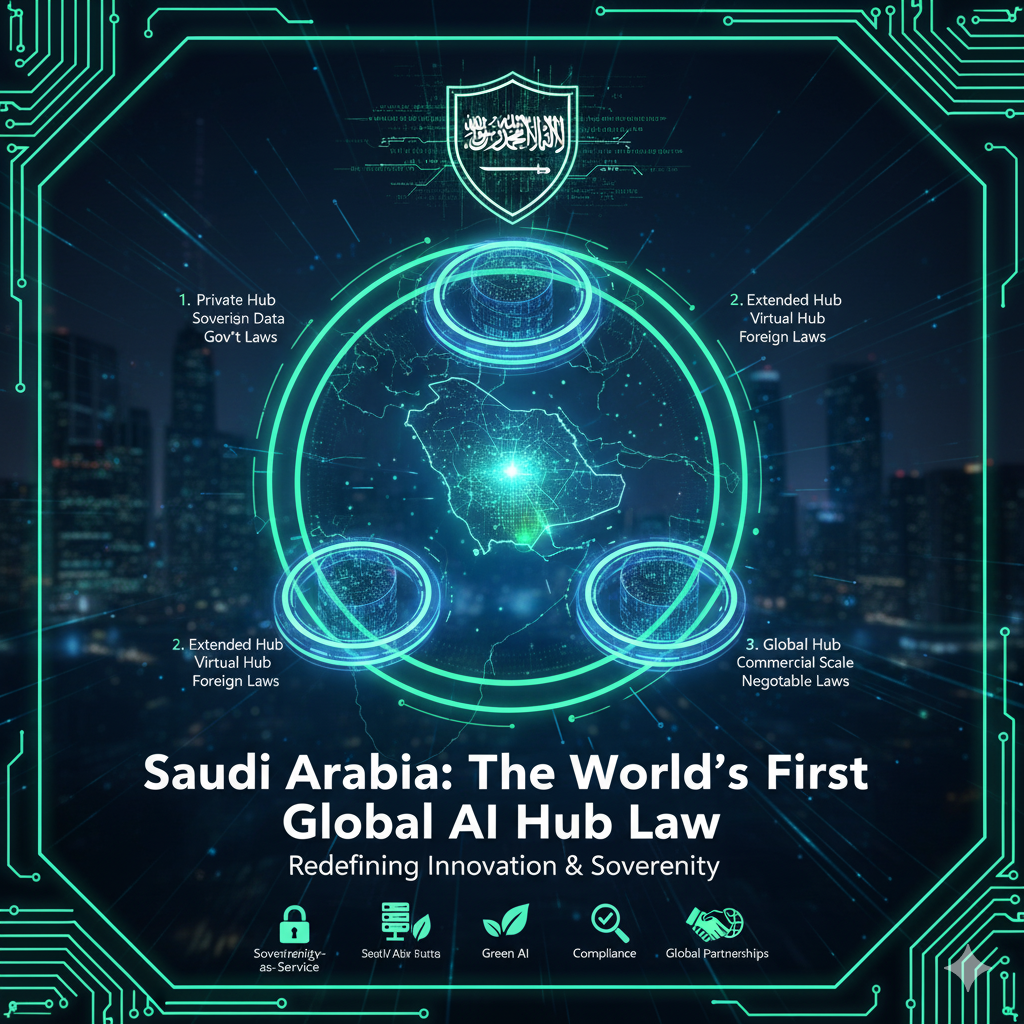
The Draft Global AI Hub Law: Redefining Innovation, Sovereignty & Compliance from Saudi Arabia
Share
The Draft Global AI Hub Law: Redefining Innovation, Sovereignty & Compliance from Saudi Arabia
🚨 Saudi Arabia has just made history by proposing the world’s first “Global AI Hub Law”, setting a bold precedent in how nations can host foreign AI data infrastructure under non-local legal regimes.
📅 Released by the CST on April 14, 2025 (consultation ended May 14), this law makes Saudi Arabia the first G20 country to propose a “data embassy” model at scale — shifting digital sovereignty from walls to bridges.
🧠 What’s in the Law? A 3-Tier AI Hub System

Saudi Arabia introduces a three-layer AI Hub architecture:
Hub Type Jurisdiction Purpose Private Foreign Government Sovereign gov’t data (e.g., embassies) Extended Guest Country Laws Hyperscalers, global clients Virtual Designated Foreign Laws Cloud services, commercial scale
💡 The concept of "negotiable sovereignty" lets countries and companies choose their governing laws while operating inside Saudi Arabia.
🔐 Sovereignty-as-a-Service
Unlike GDPR (EU) or China’s localization mandates, Saudi Arabia’s approach is unique: ✔️ Foreign laws govern data on Saudi soil ✔️ State-to-state digital extraterritoriality ✔️ Emergency overrides and national security clauses apply
🚀 What It Means for AI and Tech
- ⚡️ Faster AI Deployment: Strategic location cuts latency across Asia, Africa, and Europe
- 🌱 Green AI: Powered by Saudi’s renewable energy surge
- 💸 High-Value FDI Magnet: Big incentives for AI labs, R&D, and hyperscale compute
⚠️ But There Are Challenges
- Legal conflicts across hubs (e.g., GDPR vs. non-EU regimes)
- Undefined regulator (“Competent Authority”)
- Export limitations due to U.S. chip restrictions
📊 Compliance Gets Complex

🛡️ Legal teams will need new indemnity models, cross-border clauses, and tiered governance policies.
🌍 Global Ripple Effects
- 🇨🇭 Digital Switzerland? Saudi bids for neutral hosting of sensitive data
- 🤝 Possible EU partnerships via “extraterritorial GDPR zones”
- 🧠 New demand for compliance advisors, legal tech, and AI infra consulting
💬 Final Thought
The Draft Global AI Hub Law is more than legislation — it’s a blueprint for how nations can coexist digitally without ceding control.
Saudi Arabia is betting that jurisdictional agility + national oversight will be the future of AI governance.
🔎 One question remains: Will other nations follow — or resist — this new model of digital sovereignty?
📝 Submission to CST – Feedback on the Global AI Hub Law
Submitted by: Muzaffar Ahmad Founder & CAIO, Kazma Technology | DataAutomation, Saudi Arabia
Strategic Recommendations to Enhance the Global AI Hub Law Framework and Maximize Its Impact
As the Founder of Kazma Technology and DataAutomation — a Saudi-born brand at the forefront of AI innovation, responsible AI adoption, and digital transformation — I commend CST for this bold step forward. Below are key recommendations I’ve submitted to the Commission:
1. Operationalize Responsible AI at the Core
Embed AI ethics and governance into the legal fabric:
- Mandate AI Ethics Boards in sovereign/extended centers
- Require Responsible AI Audits
- Incentivize bias mitigation, explainability, and human-in-the-loop models
Trust is the new currency — Saudi Arabia can become a trust-first AI destination.
2. Empower Local Innovation Through Tiered Sandboxes
Support homegrown talent by:
- Launching regulatory sandboxes for Saudi/regional startups
- Implementing compliance tiers by company size
3. Establish a Cross-Border Data Sovereignty Protocol
To handle legal ambiguity, create:
- A unified Data Sovereignty Charter (aligned with GDPR, ITU, OECD)
- Transparency for data localization exceptions
- Clear rules for mobility across hub types
4. Integrate AI-Driven Regulatory Infrastructure
Modernize oversight with:
- AI-powered compliance tools
- RegTech-as-a-Service offerings for firms
5. Sustainability and Green AI Incentives
Future-proof the law with:
- Incentives for low-emission data centers
- Green certifications and benchmarks
Closing Remarks
As a long-time advocate for AI ethics and automation in the region, I fully support CST’s vision. With the right guardrails, the Global AI Hub Law can make Saudi Arabia the moral and technical standard-setter in the AI age.
